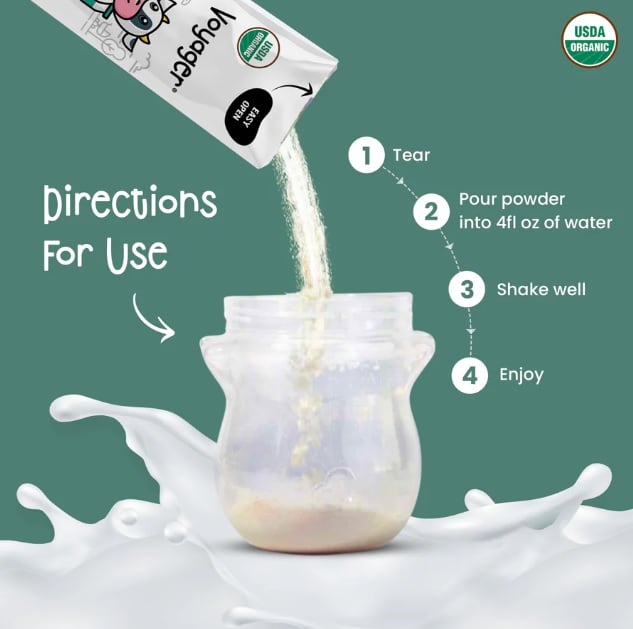Most traditional retailers, including grocery stores, mass merchandising outlets and convenience stores charge manufacturers between $250 to $1,000 per item per store to stock their product – which, NIQ notes can add up quickly with smaller launches in regional stores averaging about $25,000 per item. In high-demand markets, this can increase exponentially to upwards of $250,000 per item.
These fees act as an insurance for retailers taking a chance on new products, which face a staggering 70% or higher failure rate, according to the Federal Trade Commission.
While retailers sometimes will waive slotting fees if a company can show their product is outgrowing the competition or can boost basket ring by increasing sales of complementary products, startup Voyager Milk is sidestepping the issue altogether by seeking initial distribution through alternative channels that do not charge for product placement.
Voyager Milk Co-founder Alexandra Bertholet explained to FoodNavigator-USA that the company’s dehydrated whole milk in convenient stick packs is well positioned for this strategy because many of the alternative retail outlets that forgo slotting fees are also where the startup’s consumers most need its product.
“Because of how portable [our product] is, we really see ourselves being in airports, being in hotel markets, being in baby stores,” and other non-traditional outlets where caregivers commonly shop and which do not typically charge slotting fees, like most grocery stores.
Voyager Milk Co-founder Alexandra Bertholet
For example, getting milk through airport security checkpoints – even when measured to comply with TSA guidelines – can be frustrating and uncertain for many caregivers. Bertholet recalls a time when her toddler cried because his milk was confiscated by TSA, and the family could not find whole milk in any of the airport stores on the other side of security.
That terrible experience inspired Bertholet and her husband to create Voyager Milk, which is dehydrated organic whole milk from grass-fed cattle combined with tricalcium citrate and organic vitamin D3. The powder can be poured easily from a stick pack into narrow bottles or in children’s sippy cups and combined with water to create a “smooth, creamy” tasting beverage that Bertholet said meets strict quality European standards.

Beyond convenience, Voyager offers caregivers a clean label alternative to many of the toddler milks currently on the market, which have come under fire by public health advocates for including added sugar and palm oil, noted Bertholet.
“Because of how portable [our product] is, we really see ourselves being in airports, being in hotel markets, being in baby stores,” and other non-traditional outlets where caregivers commonly shop and which do not typically charge slotting fees, like most grocery stores, Bertholet said.
She explained that Voyager Milk plans to prove its concept in these non-traditional outlets and leverage sales and consumer data gathered through this channels to build its case for waiving slotting fees when it eventually enters more traditional grocery stores.
Win over buyers by highlighting how a product solves an everyday problem
As a participant in the most recent cohort of the Real California Milk Excelerator powered by VentureFuel, the Voyager team met with retailers one-on-one for mock presentations, where Bertholet said she learned the best way to win over a retail buyer was to present her product as a solution for an everyday consumer challenge.
“We are able to win over people that have kids. They feel the pain of trying to go through TSA or trying to go through security with kids” and their milk, and conveying that to buyers helps make the case for why retailers should stock Voyager Milk, she said.
She also shares with buyers other pain points that Voyager Milk solves, such as wanting “fresh, good quality milk” to add to coffee on planes, in hotels or when camping, she said. The product also can be added to on-the-go meals for an extra protein boost or enhanced mouthfeel, like oatmeal cups to which consumers just add water.
Ongoing innovation
In the coming year, Voyager Milk is focused on expanding its distribution, but it also is exploring line extensions and consumer brand awareness.
The company is in talks with JetBlue to be in select lounges, and it is exploring distribution in the Middle East, including piloting its product in a retailer in Kuwait. It also is focused on its home region in California where the Real California Milk seal is well-recognized and appeals to consumers seeking local options.
As for new products, Bertholet sees potential for flavored milk, a lactose-free option or a stick pack with A2 milk for easier digestion.
Finally, she said, the company wants to partner with influencers to build its digital footprint and consumer awareness to ultimately drive foot traffic to its retail partners.
